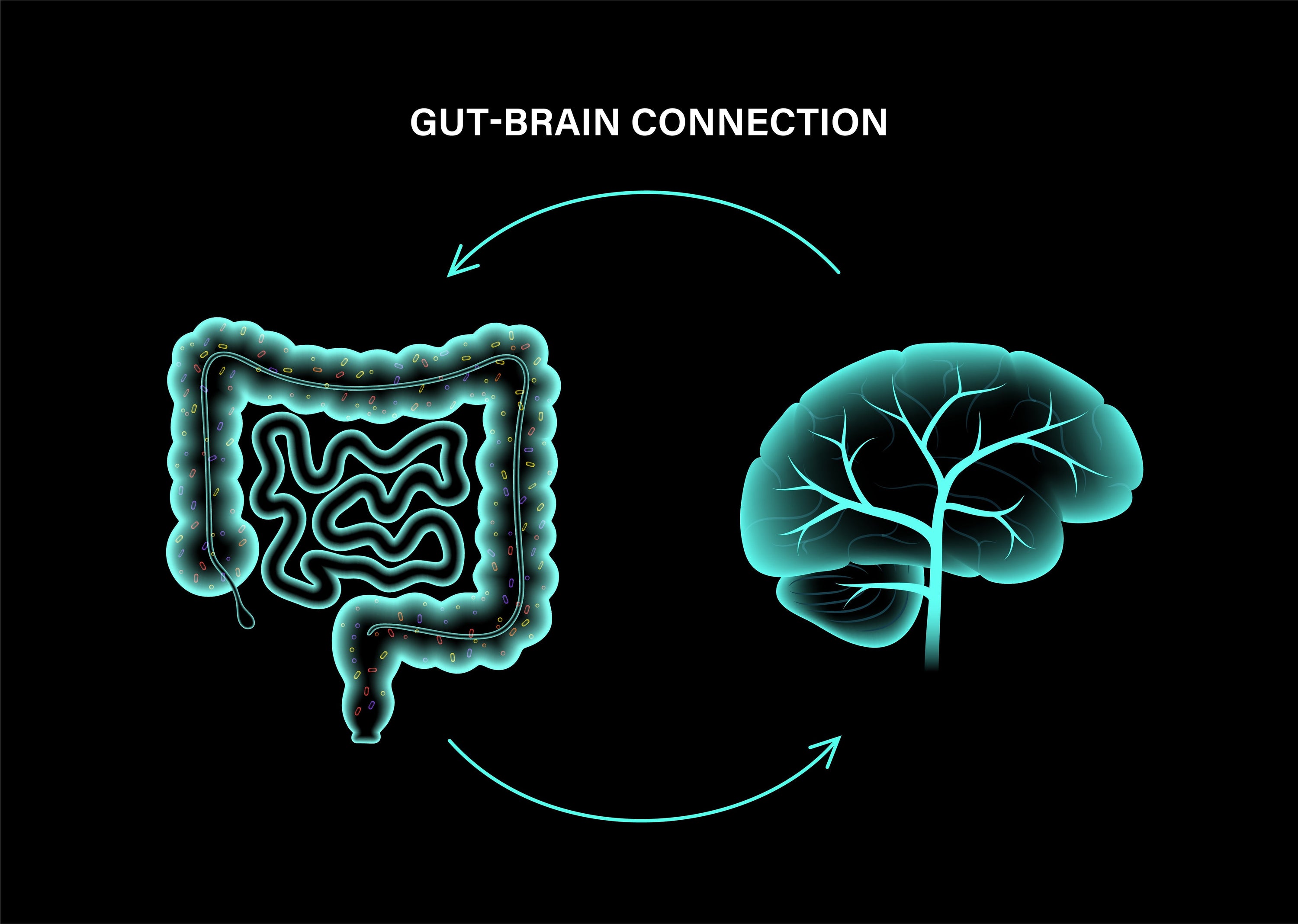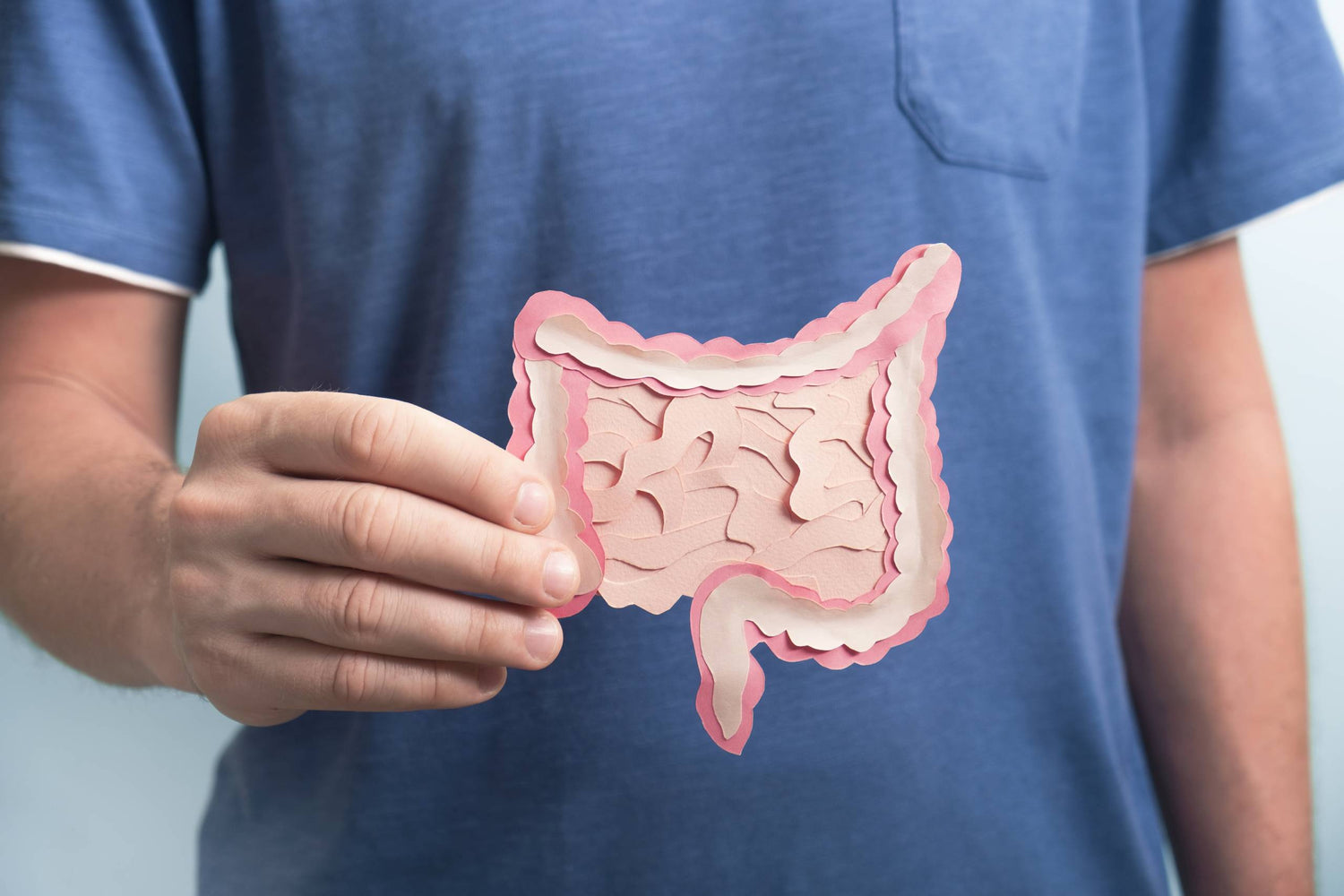We often think of mental health in terms of brain chemistry, emotional stress, or life circumstances. But growing research shows that our gut health and brain are more intertwined than we previously realized.
If you’ve ever had “butterflies” in your stomach before a big event or felt digestive discomfort during times of high anxiety, you’ve already experienced the brain and gut connection at work. These signals are part of a powerful two-way communication system between the gut and the brain—known as the gut-brain axis.
The link is more than metaphorical. The gut contains more than 100 million nerve cells and is home to trillions of bacteria. Together, they interact with the brain in ways that can influence your mood, mental clarity, and how well you handle stress.
In this article, we’ll explore how gut health affects mental well-being, how imbalances can impact mood and focus, and what you can do to support both systems.
What is the Gut-Brain Connection?
The gut-brain axis is the pathway between your central nervous system (which includes the brain and spinal cord) and your enteric nervous system (the extensive network of nerves in your gut). These two systems constantly exchange information through:
-
The vagus nerve, a major nerve transmitting messages directly between the brain and the gut
-
Hormones and neurotransmitters, such as serotonin, dopamine, and cortisol
-
The immune system
-
Gut microbes
Thanks to this ongoing feedback loop, what affects one system can quickly impact the other. Stress, for example, can lead to digestive issues like cramping or bloating. Likewise, gut imbalances, such as inflammation or reduced microbial diversity, can contribute to anxiety, depression, and difficulty concentrating.
How the Gut Microbiota Affects Your Mental Health
If you’ve ever asked, "Does gut health affect mental health?", the answer is a clear yes. The two are deeply connected, and disruptions in one can show up in the other.
Your intestines are home to trillions of bacteria, viruses, and fungi, collectively known as the gut microbiota. These microbes are essential for digestion, nutrient absorption, and immune function. But just as importantly, they play a powerful role in regulating your mental health.
Certain strains of gut bacteria help produce or influence key critical brain chemicals, including:
1) Serotonin
Commonly referred to as the ‘feel-good’ hormone, serotonin affects mood regulation, sleep, appetite, and digestion. While it acts in the brain, nearly 90% of your body’s serotonin is produced in the gut. Imbalances in serotonin levels are closely associated with anxiety, depression, and sleep issues.
2) GABA
Gamma-aminobutyric acid (GABA) is the primary inhibitory neurotransmitter in the brain. It helps calm the nervous system by reducing overactivity, promoting relaxation, and easing anxiety. Some gut bacteria naturally produce GABA or help regulate its function, demonstrating how deeply the gut health and brain are linked.
3) Dopamine
Have you ever felt a rush after checking something off your to-do list or getting good news? It’s called a dopamine hit. Dopamine drives motivation, focus, and your ability to feel pleasure. Gut bacteria can influence how dopamine is made and used in the body.
When your gut microbiome is balanced, it can support clear thinking, emotional resilience, and a more stable response to stress. But when that balance is disrupted (known as dysbiosis) it may contribute to poor mental health and cognitive challenges.
A recent study has found that individuals with depression may have lower levels of certain gut bacteria compared to those without.
Inflammation: A Common Thread Between the Gut and Brain
One of the primary links between gut health and mental health is inflammation.
When the gut lining becomes damaged or overly permeable (also known as ‘leaky gut’) it allows undigested food particles, toxins, and bacteria to slip into the bloodstream. This, in turn, triggers an immune response that may lead to chronic, low-grade inflammation in the body.
Once this inflammation reaches the brain, it can interfere with how neurotransmitters work, slow down communication between neurons, and even reduce the size of critical brain areas like the hippocampus.
Research has linked chronic inflammation to a higher risk of depression, anxiety, fatigue, and cognitive decline. Some studies have found elevated inflammatory markers in people who don’t respond well to traditional antidepressants.
How to Tell If Your Gut Health is Affecting Your Mood
Gut issues don’t always show up as stomach pain or bloating. In fact, many people with gut imbalances experience mental and emotional symptoms first.
Here are some common signs your gut health may be impacting your mental well-being:
-
Persistent brain fog or difficulty concentrating
-
Mood swings or irritability
-
Chronic fatigue or low energy levels
-
Poor stress tolerance
-
Anxiety or feelings of dread without an obvious cause
-
Depression, especially when unresponsive to typical treatments
These symptoms can indeed stem from a variety of causes. But when several of them show up at once—especially alongside digestive issues—it’s worth looking at the gut as a potential contributor.
Supporting Gut Health for Better Mental Clarity
Improving your gut health can have ripple effects on your emotional and mental well-being. Here are some evidence-backed tips to help you get started.
1) Feed Your Gut the Right Foods
The microbiome thrives on fiber-rich, plant-based foods that nourish beneficial bacteria and support microbial diversity.
Make sure your diet has:
-
Prebiotic foods like garlic, onions, asparagus, bananas, and oats to feed good bacteria
-
Probiotic foods such as yogurt, kefir, sauerkraut, and kimchi for live, active cultures
-
Polyphenol-rich foods like berries, green tea, olive oil, and cocoa to reduce inflammation and encourage microbial balance
Additionally, avoid processed foods, refined sugars, and excess alcohol to reduce inflammation and support a balanced microbiota.
2) Take Targeted Supplements for Brain Function
Because the gut-brain axis is a two-way street, supporting your brain can also benefit your gut. Supplements that include probiotics, essential amino acids, and key vitamins can help regulate mood, boost mental clarity, and support a balanced gut environment.
Clear Focus by recomnd™ is an excellent option in this regard. It blends adaptogens, nootropics, and essential nutrients designed to support cognitive performance while reinforcing gut health and brain connection. Taken daily, Clear Focus can enhance alertness and mental energy, without the crash or overstimulation common with caffeine-based products.
3) Manage Stress Effectively
Chronic stress interferes with both gut health and mental performance. It can slow digestion, increase gut permeability, and shift your microbial balance.
To manage stress in a gut-friendly way, try:
-
Deep breathing or meditation to calm the nervous system
-
Gentle movement, such as walking, yoga, or stretching
-
Time outdoors in green or natural spaces
-
Journaling or talk therapy to process emotions and reduce internal tension
A few minutes of intentional stress relief can help restore balance and protect both your mind and gut over time.
4) Get Quality Sleep
Sleep and gut health are highly connected. Your microbiome follows a daily rhythm, much like your brain and body. Poor or irregular sleep can contribute to inflammation and cognitive fatigue.
Be sure to turn off screens an hour before bedtime. Avoid heavy meals or caffeine late in the day. Also, keep your bedroom dark, cool, and quiet to help you decompress.
Aim for 7 to 9 hours of high-quality sleep each night. This gives your gut time to regulate itself and helps your brain recharge, so you can feel calmer and more focused the next day.
View the Mind and Body as One
Your brain doesn’t function in isolation. A healthy gut and mental health go hand in hand.
If you're dealing with brain fog, low mood, or chronic stress—and the usual solutions haven’t worked—it may be time to look inward.
At recomnd™, we create supplements designed to support your body’s natural systems, strengthen the gut-brain connection, and promote long-term well-being.
Ready to feel the difference from the inside out? Contact us or browse our site to explore formulas that help bring your brain and body back into balance.




